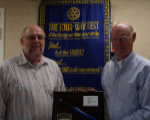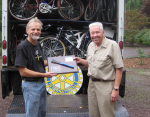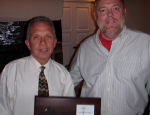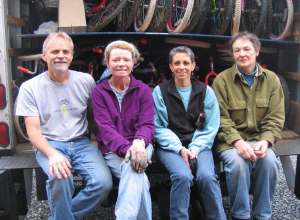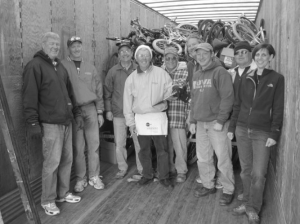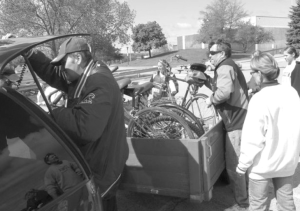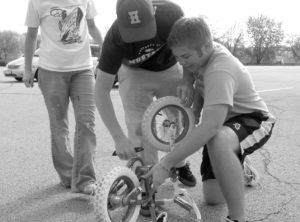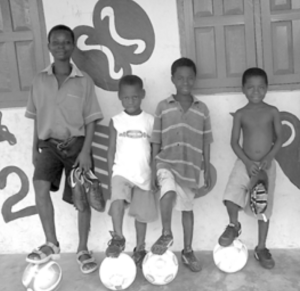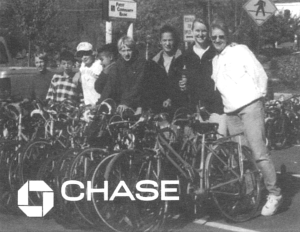by David McKay Wilson
Fall 2006 InGear
When the Westchester Cycle Club began planning a used bicycle drive for Pedals for Progress, we hoped to collect 150 bikes. That was enough to fill the truck we rented to deliver them to High Bridge, New Jersey, where Pedals for Progress is based. But then we partnered with several houses of worship, a few community groups, and we knew we’d need to rent a second truck. In fact, we needed every inch of three trucks, including Pedals for Progress’ own box truck, to fit the 543 bikes and 10 sewing machines we collected on April 1, 2006.
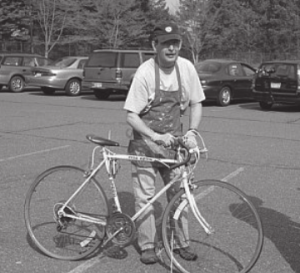 None of us could’ve guessed when we first started planning that we’d hold the second largest collection in Pedals for Progress’ 15-year history. It’s a credit to the generous residents in the northern suburbs of New York City, who came in droves with their used bikes and checkbooks. Word of mouth, flyers, and Kenneth Edding’s article of the upcoming event in The Journal News generated lots of publicity. Of course, without all the cheerful volunteers who all came together in the sprawling parking lot behind Memorial United Methodist Church, we’d never have been so successful. They gathered at 8 a.m. that morning brimming with energy even though the weather report called for a 50 percent chance of rain. But Reverend Joe Agne assured us that he’d ordered up an ideal day. Soon, we saw patches of blue in the morning sky, and as the sun peeked through, some happy cardinals sang their sweet songs.
None of us could’ve guessed when we first started planning that we’d hold the second largest collection in Pedals for Progress’ 15-year history. It’s a credit to the generous residents in the northern suburbs of New York City, who came in droves with their used bikes and checkbooks. Word of mouth, flyers, and Kenneth Edding’s article of the upcoming event in The Journal News generated lots of publicity. Of course, without all the cheerful volunteers who all came together in the sprawling parking lot behind Memorial United Methodist Church, we’d never have been so successful. They gathered at 8 a.m. that morning brimming with energy even though the weather report called for a 50 percent chance of rain. But Reverend Joe Agne assured us that he’d ordered up an ideal day. Soon, we saw patches of blue in the morning sky, and as the sun peeked through, some happy cardinals sang their sweet songs.
We didn’t have to wait long to get cranking. Our biggest donor, the Andrus Children’s Center in Yonkers, had delivered 65 bikes ahead of time. An official from the Children’s Center saw the article about the bike collection and called saying she already had bikes. Initially, she didn’t have a way to get them all to our lot in White Plains, nor did she have $650 to cover the $10-per-bike shipping charge. Sure enough, though, she found a local moving company willing to donate a truck to move them. And even though the Westchester Cycle Club already committed $750 to the event, a plea for additional contributions on the Club’s online message board raised $650 more to cover these bikes.
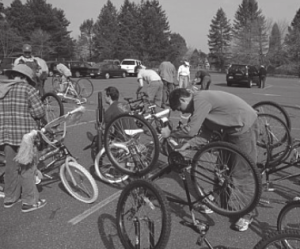 So when we arrived Saturday morning, 65 bikes were waiting to be addressed. That’s when Pedals for Progress CEO Dave Schweidenback, in his bright orange T-shirt and white bandanna, gave us all a quick lesson in how to process bikes for shipment: remove the pedals and Zip-tie them to the frame, loosen the stem bolts and turn the handlebars parallel to the frame, lube the chain. Once we got started, our first truck arrived with 25 bikes from Camp Olmstead in Cornwall-on-Hudson. This truck also held another 30 that a Westchester Cycle Club member had in her garage. These were donated by members of her synagogue and local school PTA. And we had to make a second trip to her house to retrieve 40 more bikes, including 20 donated by a local police department, which had cleaned out a storage room crammed with abandoned bikes. The PBA also kicked in $200 to help cover shipping costs.
So when we arrived Saturday morning, 65 bikes were waiting to be addressed. That’s when Pedals for Progress CEO Dave Schweidenback, in his bright orange T-shirt and white bandanna, gave us all a quick lesson in how to process bikes for shipment: remove the pedals and Zip-tie them to the frame, loosen the stem bolts and turn the handlebars parallel to the frame, lube the chain. Once we got started, our first truck arrived with 25 bikes from Camp Olmstead in Cornwall-on-Hudson. This truck also held another 30 that a Westchester Cycle Club member had in her garage. These were donated by members of her synagogue and local school PTA. And we had to make a second trip to her house to retrieve 40 more bikes, including 20 donated by a local police department, which had cleaned out a storage room crammed with abandoned bikes. The PBA also kicked in $200 to help cover shipping costs.
Finally, Dave Schweidenback provided a valuable lesson in packing a truck to the gills with bikes. Bikes were put in side-by-side alternating front wheel forward then rear wheel forward. With the handlebars turned parallel to the frames, the bikes were flat enough to fit about 15 in the width of the truck. Once a row was complete a sheet of plywood was laid on top of the bikes and another row was stacked on top of the first. When all was done and loaded, the trucks were packed so tight there was barely enough space left to fit the buckets of tools.
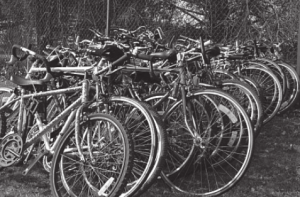 As we worked on filling the last truck, Reverend Agne’s weather guarantee dissolved in a deluge that soaked the volunteers in a surprisingly warm spring rain. No matter. We filled the truck, and by 1:45 p.m., our second team of drivers was on their way to New Jersey. That’s how we collected, processed, packed and delivered 543 bikes. There had been a job for everyone—a seven-year-old wheeled processed bikes for loading, teens earning community-service credits for high school packed the trucks, and senior citizens loosened pedals and bolts that hadn’t seen a wrench in decades. Finally, at a little after 6:00 p.m., our second truck returned from Jersey concluding a long but satisfying day.
As we worked on filling the last truck, Reverend Agne’s weather guarantee dissolved in a deluge that soaked the volunteers in a surprisingly warm spring rain. No matter. We filled the truck, and by 1:45 p.m., our second team of drivers was on their way to New Jersey. That’s how we collected, processed, packed and delivered 543 bikes. There had been a job for everyone—a seven-year-old wheeled processed bikes for loading, teens earning community-service credits for high school packed the trucks, and senior citizens loosened pedals and bolts that hadn’t seen a wrench in decades. Finally, at a little after 6:00 p.m., our second truck returned from Jersey concluding a long but satisfying day.
In retrospect, it seems like we only touched the surface as we mined our region’s garages and basements for used bikes. We had 245 individuals bring 433 bikes. Three organizations brought an additional 110. Yet thousands of households are within a 20-mile radius of our collection site, and nearly every household has at least one unwanted bike collecting dust in a garage or basement. We just know there are more bikes for Pedals for Progress out there. There has to be. We’ll get those next year.

